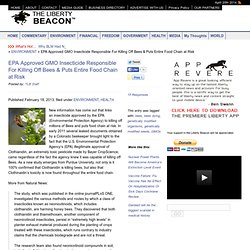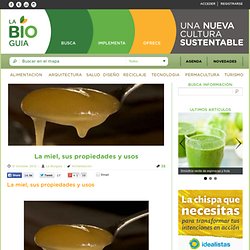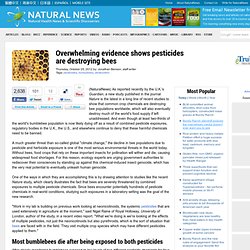

Fun Facts about Beekeeping and Bee's. EPA Approved GMO Insecticide Responsible For Killing Off Bees & Puts Entire Food Chain at Risk. New information has come out that links an insecticide approved by the EPA (Environmental Protection Agency) to killing off millions of Bees and puts food chain at risk.

In early 2011 several leaked documents obtained by a Colorado beekeeper brought light to the fact that the U.S. Environmental Protection Agency‘s (EPA) illegitimate approval of Clothianidin, an extremely toxic pesticide made by Bayer CropScience, came regardless of the fact the agency knew it was capable of killing off Bees. As a new study emerges from Purdue University, not only is it 100% confirmed that Clothianidin is killing bees, but also that Clothinaidin’s toxicity is now found throughout the entire food chain.
More from Natural News: The study, which was published in the online journalPLoS ONE, investigated the various methods and routes by which a class of insecticides known as neonicotinoids, which includes clothianidin, are harming honey bees. Read original here: Seis toneladas de miel pitiusa. PEP RIBAS | IBIZA La recolección de la miel natural producida por las abejas es una práctica en aumento en las Pitiusas.

Es lo que se desprende de los datos facilitados por la Associació d´Apicultors d´Ibiza i Formentera, que ayer convocó a sus socios a un vino español en el Centre Cultural de es Puig d´en Valls, para facilitar el contacto entre ellos y felicitarles el año. Según el portavoz, Vicent Marí, actualmente el colectivo cuenta con 102 socios activos, nueve más que hace un año, y se aprecia un número creciente de interesados en apuntarse. Este centenar de apicultores, en su gran mayoría aficionados, han recolectado a lo largo del último año aproximadamente seis toneladas de miel de distintos calibres, aunque en todos los casos, «de óptima calidad», según la califica Vicent Marí, citando a «expertos nacionales» que han valorado este producto en distintas convenciones. La miel, sus propiedades y usos. + 1Email 14.9K 17+ 110Email La miel, sus propiedades y usos Propiedades de la miel: Las abejas recogen el néctar de las flores y de ahí elaboran la miel, podemos decir que las propiedades curativas de la miel de abejas son muchas y debemos aprovecharlas.

Por las propiedades que posee es utilizada como un remedio curativo desde tiempos remotos, ya que desde hace mucho tiempo se la reconoce como antiséptica, dietética, edulcorante, tonificante, calmante, laxante y diurética. La miel es una sustancia que contiene un gran nivel de proteínas y es muy curativa y esto es comprobado científicamente, es una gran fuente de energía aparte es muy eficaz en la lucha de enfermedades cardíacas y es depurativa del organismo. También está comprobado que durante la menopausia de la mujer la miel estimula las hormonas, lo que la convierte en una sustancia muy saludable. Otros usos: Tomada en ayunas con limón es un remedio contra el resfriado, las dolencias de garganta o la congestión nasal. Sociedad Cooperativa Apicola de España - El mejor sitio para informarse sobre la miel.
Electrosmog and colony collapse disorder. Overwhelming evidence shows pesticides are destroying bees. (NaturalNews) As reported recently by the U.K.'s Guardian, a new study published in the journal Nature is the latest in a long line of recent studies to show that common crop chemicals are destroying bee populations worldwide, which will also eventually destroy much of the world's food supply if left unaddressed.

And even though at least two-thirds of the world's bumblebee population is now likely dying off as a result of combined pesticide exposures, regulatory bodies in the U.K., the U.S., and elsewhere continue to deny that these harmful chemicals need to be banned. A much greater threat than so-called global "climate change," the decline in bee populations due to pesticide and herbicide exposure is one of the most serious environmental threats in the world today. Without bees, food crops that rely on these important insects for pollination will wither and die, causing widespread food shortages. Be sure to check out the full video interview with both Raine and Gill at: The Importance of Bees.